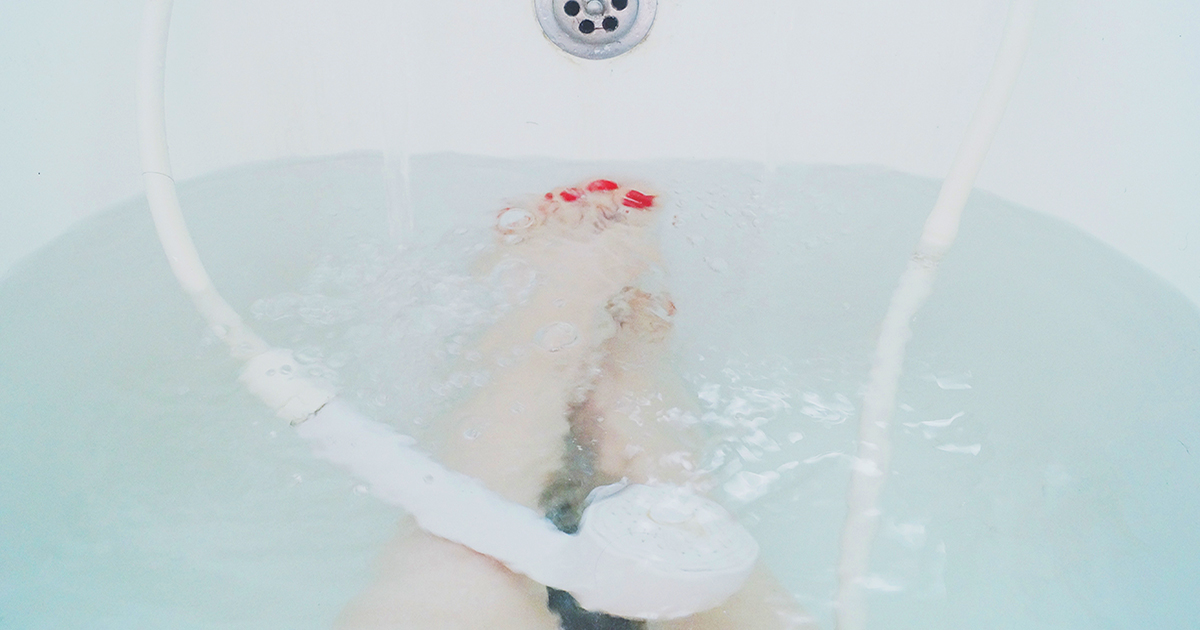GAZE
★ ★ ★ ★
ON BEING CLEAN

By Irena Ioannou
“Try out out our new skin care product,” a heavily made-up woman called out as soon as I entered the shopping mall. At least this one was polite, not trying to corner me with a spray, or a cream, or a gel in hand, while hurling questions like, “Which facial cleanser do you use? Is your face oily or dry?”, and not giving me the time to answer.
Once I made the mistake of admitting that I don’t use a night cream at all. The young girl—hardly in her twenties—immediately signalled to the head marketer to come over and examine my face. How could I do this to myself? Hadn’t I heard of pollution? Of dirt? Of aging? And if I was left untouched by their frightening descriptions, didn’t I just want to feel, you know, “refreshed” and “clean”?
How can you say no to that?
A woman’s role is to remain clean, pure, fresh, hygienic (and of course young)—pick your adjective. Even religions stress the importance of a woman’s clean skin, imposing special rules for women who are menstruating and thus unclean to attend service, let alone have their prayers heard.
And if you’re not the religious type, don’t worry, the cosmetics industry is here to remind you every single day that a woman is expected to remain clean, or better, spotless, that she can beat time if she wants, and that there is a formula and a solution for absolutely every type of woman to choose from: cosmetics without glycerine or parabens, 100% organic, with airless or biodegradable packaging, you name it and they will deliver, or rather the industry is already one step ahead of you to let you know that your needs are their sole concern. They are working for you, actually, inventing skin problems you didn’t even know you had, and having the solution ready for you to buy. A faithful industry with a 62.46 billion US dollar revenue between the years of 2002 and 2016 in the USA only.
Which makes me think that by buying that sulphate-free face balm I am probably giving another teenager the opportunity of a cosmetics career.
And at the same time I’m turning my back on scandals revealing that cleaning products could actually contain toxic chemicals that do more harm than good, or that certain personal care products contain microbeads, or “plastic bullets”, that end up in our oceans and get ingested by fish with unknown yet impact on the food chain.
Or ignoring the fact that the cosmetics industry actually profits by exploiting under-aged workers in cocoa farms, palm plantations and mica mines in countries that haven’t even solved the problem of clean water, to help you keep your skin clean.
So why this obsession with cleanliness? And what do we really think about it?
* * * *
“Be careful, don’t get dirty,” I often catch myself calling to my children. At their age, I wouldn’t return home before nightfall and I had bloody knees and all the filth of the neighbourhood street on my skin.
Times change though. Today if I let my children play outdoors unaccompanied, I’d probably get sued. And along with the shift in habits is a shift in the way we view our contact with nature—and with dirt and filth—as something that has to be avoided at all costs.
The problem is that filth has acquired such a negative connotation that as parents we prefer to buy our children screens (mobiles, tablets, etc.) to keep them still, quiet and of course clean, rather than make them change their clothes three times a day, or heaven forbid, have clothes on with stains on them!
But why? My children also ask me that. “Why? We do have a washing machine, don’t we?”
The answer lies in our tendency to pay more attention to the facade than to the core of things. Our body image, our appearance, counts more than our inner attributes. It’s the way others see us, and not how we really are that counts.
We don’t tolerate people with filthy mouths, but we don’t mind them having filthy minds (as long as they keep their thoughts to themselves). Because cleanliness has come to be closely associated with order and therefore clean children mirror their mother’s ability to parent them. We live in a world of perceptions, as fashion designer Bill Blass so eloquently put it.
So when my children ask me why they shouldn’t get dirty, the honest answer would be, “Because it makes me look bad, and people will seize the chance to point a finger at me”. But I can’t say that. I can’t even admit it.
Instead, I mumble lame excuses about fabrics that don’t clean easily, not wasting water, the lack of time to iron, to which my children’s response is usually, “Don’t iron, then. I’ll put my shirt under my mattress, like in the army.”
Don’t tempt me.

Irena Ioannou writes from Crete, Greece and her work has recently appeared or is forthcoming in Amsterdam Quarterly, Open Thought Vortex, Mortar, MOON, S/tick and Literary Mama.
























Great article. We do indeed live in a world of superficial values.